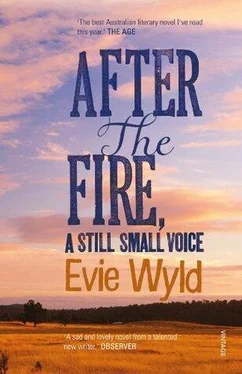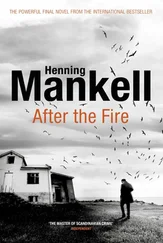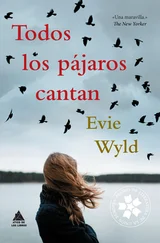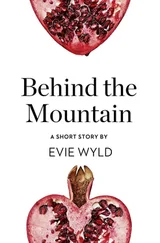She was talking now, softly to herself perhaps, and he could hear a mumble, but not the words. Her frown deepened as she shaved under his chin and he saw her wince at something there. She got up and went to the kitchen and when she came back she had a box of matches, tweezers, and a pin stuck on the end of a cork. Outside there was a roll of thunder and, as it passed over, Frank’s ears cleared and hot seawater ran down his neck. There was a whine from his tear ducts. ‘I can hear,’ he said.
‘It speaks,’ said Vicky.
‘What are you doing?’
‘Ticks. You’re buggered with them.’ She tilted back his head and heated the pin in the flame of a match until it was black, then approached his throat with it. He felt a small warmth, a pressure and Vicky went in with the tweezers, her eyes squinting. Frank held his breath and she moved back. ‘Got ’im,’ she said under her breath and dropped the bud-looking bastard into the water. She heated the pin again and went back to it. With the pin to his throat she said, ‘Bob told me what happened back in Canberra, you know.’ Frank didn’t reply. His face was hot. ‘Reckon you might be making yourself a little bit crazy out there all alone?’
‘What about you?’ He felt angry suddenly, dangerous, the urge to grab her wrist and look her in the eye. But he didn’t.
‘What about me, what?’
‘Bob catches it a bit off you sometimes. Can’t tell me you’re not driving yourself a little bit nuts.’ There was a small sharp pain in his neck and he couldn’t tell if she’d pricked him on purpose.
She smiled softly and there was a silence, an intake of breath. She sat back on her stool, another tick held tight between the jaws of the tweezers. ‘It’s not me that does that to Bob.’
‘You mean it’s not the real you?’
She smiled tightly. ‘No. I mean he does it himself. I’ve had to pull the lock off the bathroom door. He goes in there and hits his face against the sink.’
Frank was silent and Vicky continued removing the ticks. He felt his mouth fill up with spit, swallowed it down.
‘I imagine he told you it was me doing it? Being an hysterical woman all over the place? He sleeps so deeply it doesn’t wake him up when he cries out at night. These real sobs like a kid.’
Another tick out, a plip in the dirty water.
‘I can’t lie there listening to it. When Emmy died there was none of that. We didn’t cry, we just watched and that was all there was.’ The room lit up with lightning and outside the storm started with the sky falling like sand on the roof.
Frank sat in the doorway of his shack, clean-shaven, and drank instant coffee, watching the rain pouring off the corrugated roof in needle stripes of white and feeling the spray of rain on his face as it bounced off the veranda.
In the afternoon, lightning struck a field far off to the north and he heard, above the roar, the sound of trucks speeding towards it, smoke a spear on the horizon.
One storm passed with another right behind and in between the sun shone more furiously than before, trying to clean up the mess, suck up all the extra water before the next one arrived. Mist rose on the top green leaves of the sugar cane. The chickens, fluffed and offended by the storm, ventured out to pull up fat earthworms from the battered soil.
The thunder that night had Frank, Kirk and Mary awake, wide-eyed and indoors: the sound overhead of great concrete wheels rumbling and warping over the shack; the blackness between the lightning, and the flat colour when the lightning stuck; the orange bucket by the blue Ute; the green green green of the cane and the white sky; the frozen water coming down, pale and thick. He imagined at each strike a figure before the darkness and wished there were someone he could crawl into bed with. Someone who would see the rain falling like razor blades and breathe their own breath into the shack so that the window would steam up. He held a candle by the mirror and looked at the marks the ticks had left under his chin. Nine little puncture marks. He wanted to show Lucy. She’d be fascinated. She’d touch them with her cold fingers. He looked at his face and wondered what he’d have to do.
The chooks were asleep on the veranda. He emptied out a whole bag of feed around the place — he had seen them get on to the roof with furious flapping, so he figured they’d be safe from foxes. He tippy-toed to the truck, hoping not to wake them as he left.
Early in the morning the rain stopped and the sky was a leftover ice-blue. Frank stopped at a roadside for breakfast. Over tired eggs and sleepy toast, he watched other people in the truck stop. He didn’t know if they were good or bad, these lives other people had. Large men looked blankly out over the highway, a mess of yellow eggs and coffee in front of them or, for the ones whose stomachs had long forgotten the conventions of breakfast, a meat pie and cola. Their thoughts still seemed to be of the road. He tore at a napkin. It would be good to have something to concentrate on. He asked himself questions that he felt he must know the answers to. They must be somewhere inside his brain. The right thing to do. What will I say ? was the one that went round and round, and came out of his mouth with answers that never got beyond hello, because he was stopped by the word Dad. The adverts on the radio spooked him, and he turned it off and ended up counting the white lines in the road as he drove over them, or finding a tune in the engine’s revs.
The smell of Sydney came rolling at him as he reached the outskirts. The ozone, the diesel and the thick brown river. A ball bounced in his stomach. By the time he reached Parramatta he’d got as far as picturing opening the door to the shop so that he could say hello and hum the British national anthem.
The streets were black with past rain. The sun was bright now, thick yellow, and it bounded off the pavement taking steam with it. Familiar places started to show themselves. Old bus routes and short cuts to the centre of town. The smell of hot treats from the main streets. Trees lined the streets in countable rows. Smoke and electric light, the hum of aeroplanes, trains and cars, taxis and their beetling movements. It seemed to him everyone was putting on a show of living in a city; that the moment his back was turned the crowds of people, the bustle and movement would stop. The whole place would empty and sand would settle over the slick bitumen, dust clog up the wide windows of the shopping centres, the tide would swallow Bronte Beach and make its way up over the Harbour Bridge. When the Parramatta river appeared he was surprised by its brownness, by the earthiness of it, next to the steel and rust and concrete.
The Shannons’ florists had closed up, he noted with a slug of pleasure. He’d gone to school with June Shannon, a snub-nosed girl with critical eyes who lived with her grandmother. He parked the truck out at the front, felt his heart slip down into his bowels and knocking, trying to come out the other end. He could walk round the block a couple of times first. But his legs took him straight there, the old grooves dug by walking home from school, from the jacaranda tree and the park at night. The last time he’d seen the place there’d been blood in his mouth, a backward glance over his shoulder to see if his dad was watching. He wasn’t.
The shop looked different. The glass in the front window was spotless. Signs had been printed out from a computer and white-tacked neatly to the glass, advertising things he’d never imagined his father approving of — cheese twists and smoothies, chicken and mushroom pies, and milky coffees. There was a new sign with a pink halogen light behind it. His palms sweated and he thought about the truck waiting for him round the corner. The door of the shop opened and June Shannon stepped out, whip thin with that upturned nose. She held a fistful of blond child in one hand and a can of light lemon in the other. Frank looked at the ground and rubbed a spot of grease with the toe of his shoe. Don’t recognise me, June . His face got hot. Please don’t fuckin’ recognise me .
Читать дальше












